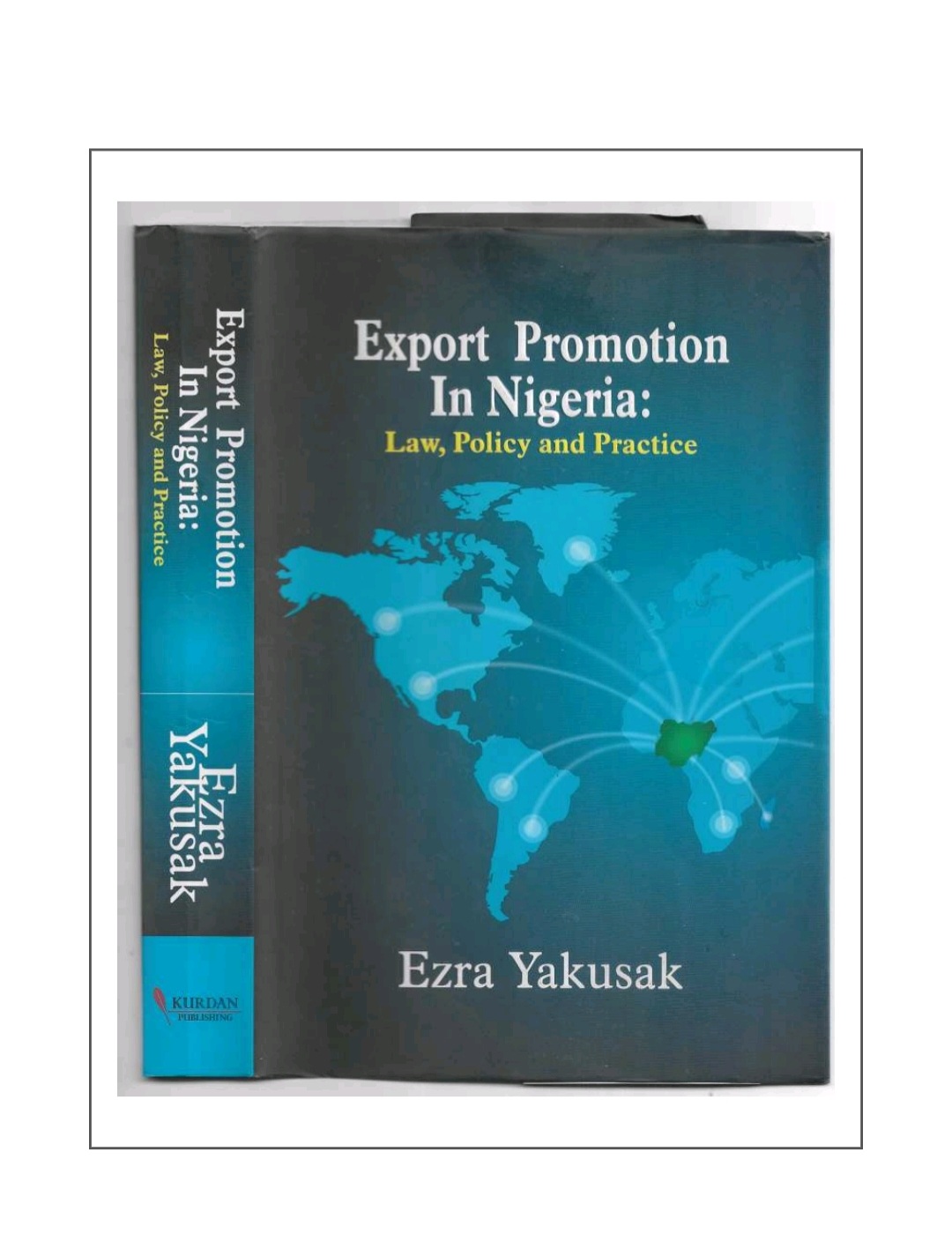Diversification of the economy means creating more than one source of foreign earnings for a nation’s economy, experts say it is necessary because it promotes the economic growth of a nation and boosts its sources of revenue.The Master Bakers Association manufacturers of bread, increased the price of bread because Nigeria relies on importation of wheat. Nigeria had solely relied on Ukraine and Russia for imports, but with the two countries that had the world’s cheapest wheat at war, Nigeria had to look elsewhere, America and Canada, whose wheat is expensive.If Nigeria had been able to produce its own wheat in commercial quantities, it would have supplied its domestic markets and exported to the world. Comfort Yakubu reviews Ezra Yakusak’s Export Promotion in Nigeria. Law, Policy, and Practice.
Before the discovery of crude oil in commercial quantities at Oloibiri community in what is today known as Bayelsa State, the mainstay of the Nigerian economy was agriculture. Yakusak explains that Nigeria was a major exporter of cocoa, cotton, palm oil, palm kernel, groundnut, and rubber and that the quality of these products attained international standards and were therefore highly competitive. Government revenue also depends heavily on taxes on those exports.
Yakusak explains how industries built around agricultural commodities began to emerge and laid the foundation for industrialisation of the country’s economy, with the oil boom of the early 70s, the agriculturalcommodity-led Nigerian economy collapsed, giving way to an economy fuelled by the oil sector.
With the volatility of the international oil market, Nigeria is susceptible to the vagaries of the global economy, which makes the fortunes of its economy unpredictable and uncertain more often than not.
Nigeria currently is a mono-economy, that is, an economy that depends on a single source of revenue, which is crude oil. This crude oil is unfortunately not refined in Nigeria. What Nigeria sells abroad is primary product with no added values to make it command higher prices at the international market.
The book shows how Nigeria is vulnerable to the volatility of the international market both in terms of price and quality of products and services to be imported into the country. Because of the weakness of the Nigerian export sector, i.e. its inability to produce as much and to export, this has resulted in structural dependency on other nations to produce for us goods and services we ought to have been producing for ourselves.
In an attempt to address these issues, successive regimes came up with various policies. The interventions by various regimes were analyzed in the book by the author, making it handy for the academia, lawyers, government officials, the media ,exporters and intending exporters.
The book is divided into eleven chapters. Chapter one is a background to the study. Here the author gives an overview of Nigeria’s post-independence economic experience, which was based on agriculture and primary products as the major source of Nigeria’s foreign exchange earnings. But the beginning of the oil boom in the early 70’s changed the narratives and Nigeria’s agricultural sector began to depreciate and finally collapse.
Yakusak shows how Nigeria became one of the world’s largest producers of oil at the expense of its agricultural sector. He discusses how various regimes made efforts to reverse this trend; the promulgation of the Nigeria export promotion council decree, which was amended in 1979, 1988, and 1992. We can see here that despite the establishment of promotion agencies, exporters are still not properly informed and many traders still engage in informal trade export, making Nigeria’s contribution to global trade insignificant.
In the second chapter, which the author dedicated to conceptual framework , the author clarified key terms and concepts used in the book. The third chapter was dedicated to the legal and institutional framework work for export promotion. He notes that one of the ways in which most nations monitor, manage, and supervise trade activities is the enactment of laws and the establishment of various institutions.
In Nigeria, the Nigerian Export Promotion Council was established in 1976 to be in charge of export promotion as its core function. We also see in this chapter that in order to facilitate grassroots export promotion in the states and also create a platform for successful export promotion initiatives, the NEPC act empowers the council to establish export promotion committees in each state of the federation. The Nigerian Export and Import Bank was established in 1991. The authour outlined the role of this bank and how the public can benefit from it, among other institutions that have a role in promoting export and how the public can benefit .
The fourth chapter examines the Policy Frame Work; the author states that successive government instituted several economic policy measures to promote and achieve a more aggressive, consistent and comprehensive export expansion programme such as the abolition of export licenses, the dismantling of the price control regime, the abolition of the former public-owned commodity boards, which had previously been solely responsible for the export of scheduled commodities, and the establishment of Nigerian trade procedures and documentation with United Nations systems.He discussed extensively the Nigeria Trade Policy (NTP), among others.
The fifth chapter is dedicated to export support services. He explained that in Nigeria, while the NEPC is the focal point for the promotion of non-oil export trade, other agencies have been set up to also handle other specific tasks of non-oil export trade.
This chapter gives an explanation of the key support services provided by the NEPC and other trade promotion agencies in Nigeria. The main goal of export facilitation, as he explained, is to reduce the transaction costs and complexity of international trade for businesses and improve the trading environment.
He explained in this chapter how, over the past 40 years, there had been several initiatives by the United Nations to move towards simplified and standardised trade documentation.
The sixth chapter focuses on export controls and regulations. The Nigerian government has enacted many legal regimes to control and regulate non-oil exports. He explained that one key reason for export control or regulation is to ensure supply of materials or products to the domestic market. This, he says, is to protect the domestic industry by providing it with easily available and cheaper domestic materials. This ensures the availability of scarce commodities to local consumers by this restriction. A physical shortage of products is curtailed due to excessive demand abroad. This type of restriction also prevents unemployment.
Export control or regulation can be initiated for the purpose of raising the standards of exportable products from a particular country and thereby improving the supply chain.Another reason for regulation of the export sector, he explains, is to help the various regulatory authorities take stock of yearly export performance, thereby instituting a mechanism of capturing relevant data on product range, quality, and value of exported products. This type of regulation is for statistical and fiscal value, he adds.
An export control measure will aid in ascertaining foreign exchange earnings and the contribution of the non-oil sector of the economy. Major themes in this chapter include the Nigerian Export Promotion Council Act; Export Prohibition Act; Export Incentives and Miscellaneous Provisions Act; and Produce Enforcement of Export Standards Act. Pre-shipment Inspection of Export Act, National Agency for Drug Administration and Control Act, Nigerian Customs Service Act. He also pointed out the gaps in Nigeria’s non-oil export laws and policies.
He showed how most laws are absolute and restrictive regulations still regulate non-oil exports. This, he says, is compounded by the ignorance and non-compliance of exporters, regulators, and other government agencies. According to him, the effect of informal exports on the Nigerian economy denies the government the opportunity to adequately capture the outflow of such exports in its trade data. Without such data, the government cannot adequately plan for that sector. It also denies exporters the opportunity to access appropriate export incentives and other concessionary policies provided by the government to encourage non-oil exports. It leads to the rejection of products or cancellation of export contracts; the government loses a lot of revenue which would have been generated through formal exports.
It encourages the export of fake or substandard products since such products are not subjected to any form of statutory control or regulation. No or inadequate enforcement of laws regulating standards has diminished the value or premium placed on Nigerian exportable products. Such products have therefore become less competitive due to obsolete packaging techniques.
He therefore recommends that all legal mechanisms regulating or controlling exports of non-oil goods should be harmonized with a view to eliminating areas of conflict. He went on further to add that there is a need to set up appropriate machinery for the enforcement of export control laws in Nigeria.That government agencies should create avenues for sensitizing exporters, academia, lawyers, government functionaries, the media, and other stakeholders On non-oil export requirements as enshrined in the various laws, He called for a review of export control laws and regulations.
Chapter seven outlines the incentive regimes put in place to boost the export of goods from Nigeria, as well as non-statutory incentives. He sheds light on the Export Development Fund, Export Expansion, Grant Fund, Export Adjustment Fund, Nigerian Export Processing Zones Authority Act, ECOWAS Trade Liberation Scheme, Conditions and Procedure for Accessing ETLS, Approval Procedure for African Growth and Opportunity Act, among others, are issues disscused. He said that an adequate incentive regime has been enacted to provide succour to Nigerian exporters. It is further observed that most of the Nigerian exporters are yet to benefit from or access those incentives. This he ascribes to the inadequate Implementation of relevant laws, lack of adequate publicity about the existence of those laws.
He concluded in this chapter that the various incentive schemes were to a large extent responsible for Nigeria’s large volume of non-oil exports and that the incentive schemes were successful in mitigating the effect of the difficult terrain of export production characterized by deficiencies in policy inconsistencies and inadequate access to finance, among other things,issues of enforcement and practice are artificial bottle necks that can be wholly tackled by various regulatory institutions.
In the eighth chapter, he discussed trade terms. Standard trade terms are internationaly accepted commercial terms defining the respective roles of the exporter and importer in the arrangement of transportation and other responsibilities. They are used in conjunction with a sales agreement or other methods of transacting the sales. The terms set the parameters for international shipments; specify the points of origin and destination; outline the conditions under which title is transferred from seller to buyer; and then determine which party is responsible for shipping costs. He examined the various terms of trade, pointing out the advantages and disadvantages. He concluded by saying some careful thought is required as to which INCOTERM is to be adopted by the parties. The model safe for Nigerian exporters was extensively discussed in this chapter.
The ninth chapter examines international trade conventions. He explains that most trade conventions are aimed at reducing barriers and providing all parties with the benefits of increased trade. He explains that in Nigeria, the making of treaties is regulated by the treaties (making procedures) act.
He dedicated the tenth chapter to Emerging strategies, strategies and concepts discussed in this chapter include Export Production Villages, Export House Scheme, establishment of foreign commercial desks, export of services/concept facility centers, the single window concept, among others. He concluded this chapter by saying export promotion is a developing and dynamic concept which requires a dynamic approach, and there is a need for trade promotion organizations in Nigeria.
Chapter eleven, which is the concluding chapter, is dedicated to summary and recommendations.
The authour has successfully examined the state of export promotion in Nigeria. He has critically xrayed the laws, practices and policies of various regimes. He provided an in-depth analysis of Nigeria’s non-oil export sector as well as emerging concepts of export promotion.
He shows how Nigeria can better tap the benefits of globalization by increasing its trade relations with other countries which could be done by improving the export sector of its economy through aggressive diversification.

Ezra Yakusak, PhD,BL, read law at the Ahmadu Bello University, Zaria.He is currently with the Nigerian export Promotion Council and a fellow at the Charted Institute of Administration








